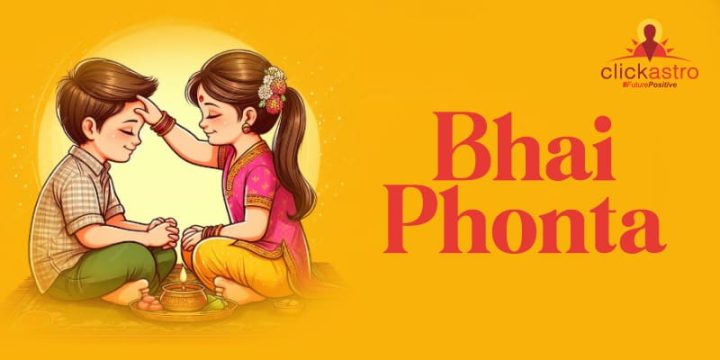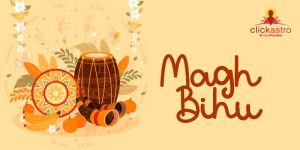Contents[hide]
Origins and Legends of Bhai Phonta
The rituals of Bhai Phonta embody devotion, mutual respect, and the sacred bond between brothers and sisters. Similar to other regional versions of Bhai Dooj, Bhai Phonta finds its origins in ancient legends that underscore sibling love, protection, and well-being. Below are two significant stories that illustrate the essence of this festival:1. Yama and Yamuna
According to this story, Yamuna, the river goddess, yearned to meet her brother, Yama, the god of death. After a long separation, Yama visited her home, where Yamuna honoured him with a ceremonial tilak on his forehead and prepared a grand feast in his honour. Overwhelmed by her love and hospitality, Yama granted her a boon. He declared that any brother who receives a tilak from his sister on this day would be blessed with a long, healthy life and good fortune. This myth forms the foundation of Bhai Phonta, where sisters pray for their brothers’ prosperity and longevity, and brothers, in turn, promise to protect and cherish their sisters.
2. Lord Krishna and Subhadra
Another popular legend connects Bhai Phonta with Lord Krishna. After vanquishing the demon Narakasura, Krishna returned to meet his sister Subhadra. Overjoyed by her brother’s safe return, Subhadra welcomed him with oil lamps, garlands of flowers, sweets, and a vermilion tilak on his forehead. Her gestures symbolized protection, affection, and goodwill. Inspired by this act of sibling love, the ritual of applying tilak on Bhai Phonta became a tradition, where sisters pray for their brothers’ safety and happiness.Rituals and Customs of Bhai Phonta
Bhai Phonta is celebrated with rituals unique to Bengal, focusing on blessings, familial bonding, and heartfelt offerings. The festival symbolizes the deep connection between brothers and sisters, with prayers for well-being and protection exchanged alongside gifts. Below are the key elements of the Bhai Phonta celebration:1. Tilak Ceremony (Phota Ritual)
The Bhai Phonta ceremony begins in the morning with the reverberation of conch shells, marking the start of the festivities. Sisters invite their brothers to their homes and seat them on an asana (a small mat or cushion) to perform the traditional tilak ritual. Dressed in their finest attire, the sisters apply phota (tilak) on their brother’s forehead, which is made using a blend of chandan (sandalwood paste), kajal (kohl), and doi (curd). The method of applying the tilak reflects familial customs: • Elder sisters use the little finger of their left hand.• Younger sisters use the right hand to perform the ritual. This tilak symbolizes protection and good fortune for the brother, marking the sister’s prayers for his safety and happiness.
2. Mantras and Blessings
As the tilak is applied, sisters chant mantras, invoking divine blessings for their brother’s health, prosperity, and longevity. These mantras carry ancient meanings, reinforcing the bond between siblings. After the tilak is applied, the brother shows his respect by touching the feet of his elder sister, receiving her blessings in return. Sisters also offer durba grass (a symbol of long life) and rice grains to their brothers, signifying abundance and prosperity.3. Exchange of Gifts
Once the tilak ceremony concludes, the exchange of gifts takes place. Brothers express their gratitude and love by giving their sisters gifts such as cash, clothes, or jewellery. This exchange reflects mutual affection and strengthens the bond between siblings. The gifting ritual is not just about material offerings but is a gesture of care, gratitude, and promises of lifelong protection.4. Fasting by Sisters
One of the most distinctive features of Bhai Phonta is the fast observed by sisters. In Bengal, sisters refrain from eating even a morsel of food or drinking morning tea until the tilak ritual is completed. This fast emphasizes the sincerity of their prayers and dedication to the well-being of their brothers, making the ceremony deeply meaningful.Feasts and Family Gatherings
Food is an essential part of Bhai Phonta, as sisters prepare elaborate meals to honour their brothers. The festival is not only a celebration of sibling love but also a time for family gatherings and bonding over sumptuous meals. Relatives and friends join in, making the occasion lively and filled with joy. Sisters put in special effort to create traditional dishes that reflect Bengal’s culinary heritage, turning the day into a feast of flavours and togetherness.Sweets and Desserts
Bengali sweets are indispensable to Bhai Phonta. Sisters prepare or arrange a variety of treats like: • Khaja: A crispy, layered pastry soaked in sugar syrup.• Sandesh: A delicate sweet made from paneer and flavoured with cardamom or saffron.
• Payesh: A rice pudding prepared with milk, rice, and jaggery or sugar. These sweets symbolize the sweetness of sibling relationships and are eagerly awaited by brothers.
Fish Delicacies
In true Bengali fashion, fish plays a starring role in Bhai Phonta meals. Popular fish preparations include: • Hilsa (ilish) curry: A mashed preparation of the prized hilsa fish with mustard and spices.• Pabda macher jhol: A light curry made with pabda fish. These dishes are served alongside rice, creating a perfect blend of flavours for the festive lunch.
Meat Dishes
Many families also prepare mutton or chicken curries to add a touch of indulgence. These curries are often spiced generously and enjoyed with luchi (fried flatbread) or steamed rice.Elaborate Lunch Spread
The lunch on Bhai Phonta is a grand affair, featuring a variety of dishes. Apart from fish and meat preparations, the spread typically includes: • Luchi (puffed fried bread).• Chutneys and pickles.
• Seasonal vegetable curries. The feast is about more than just food—it reflects the spirit of sharing, joy, and togetherness. Once the rituals are completed, families gather around the dining table to enjoy the meal, share stories, sing traditional songs, and play games. The festive atmosphere fosters stronger bonds, making Bhai Phonta a memorable occasion for everyone involved.







